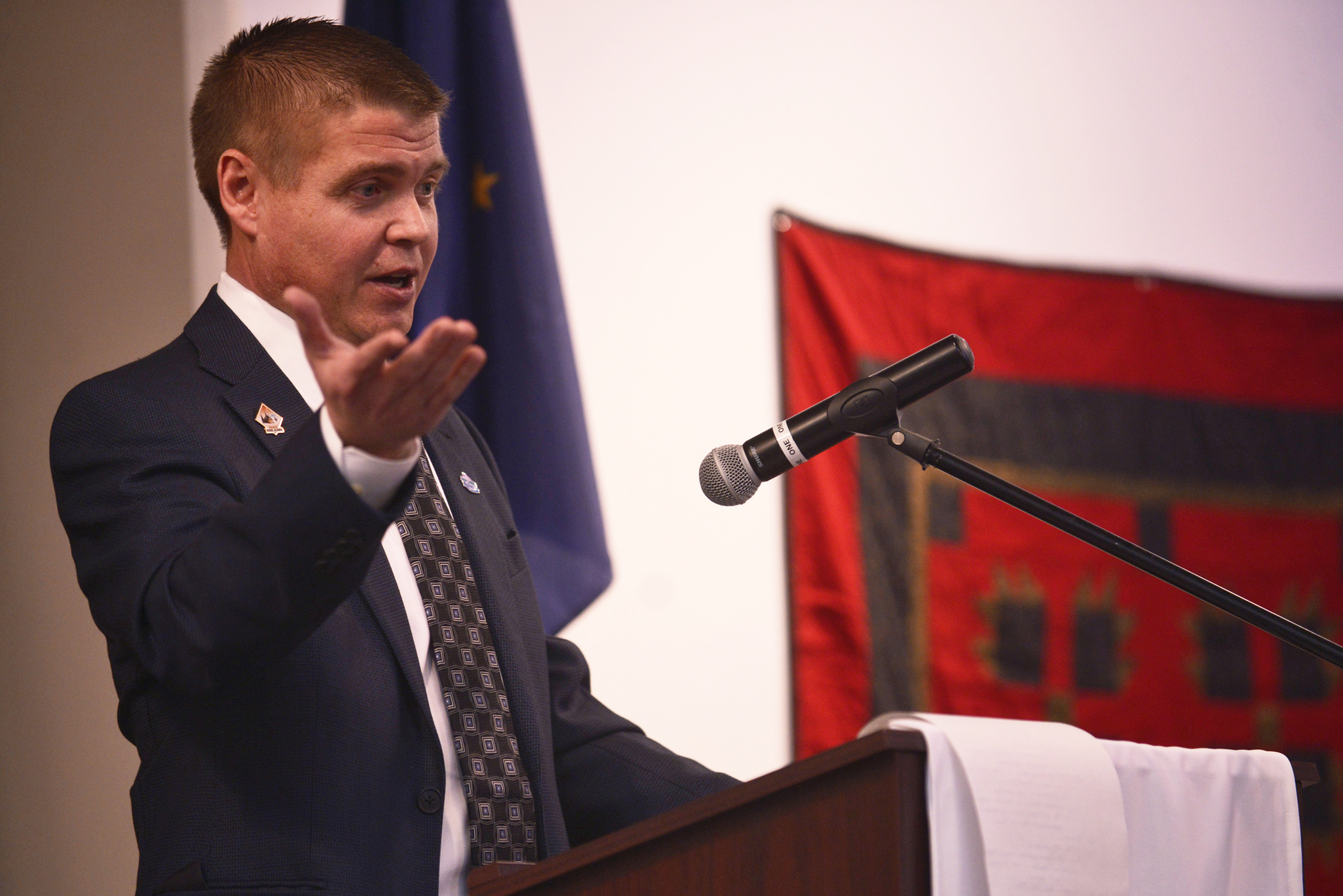After 23 days as Kenai City Manager, Paul Ostrander spoke about his view of Kenai’s finances, policies, and future obstacles to an audience of Kenai Chamber of Commerce members and the general public at the Kenai Chamber of Commerce and Visitors Center on Wednesday.
The city manager oversees municipal staff, represents the administration as a non-voting participant in city council meetings, and submits measures on behalf of the administration for the city council’s vote. Ostrander took over the job from former Kenai manager Rick Koch on Jan. 9.
Ostrander told the audience that one near-future event he’s preparing for is Kenai’s fiscal year 2018 budget, which must be ready to take effect on July 1, 2017. That budget work could be complicated by an expected revenue shortfall this year.
Between July and September 2016, Kenai’s sales tax revenue was six percent less than the previous year, Ostrander said, making it the fourth consecutive quarterly sales tax earning decrease Kenai has seen — a drop he attributed to the the general weakening of the local economy.
“Looking at (fiscal year 2018), we’re expecting some of the same things — revenues are going to be down,” Ostrander said. “We do expect — or at least project — that the sales tax has now leveled out. We think we’ve seen the bottom of that, or at least that’s what we’re hoping and that’s what we’re going to project in our (fiscal 2018) budget.”
Kenai finance director Terry Eubank, with whom Ostrander is doing budget preparation work, said in a later interview that he expects revenues to be $400,000 less than what Kenai administrators anticipated in the presently-in-effect fiscal 2017 budget.
Responding to this anticipated drop, Kenai administrators have sponsored an ordinance to return $172,653 to the city general fund from two planned capital projects — $35,000 that was appropriated to design a new event park and $20,000 for heating and hot water improvements at the Kenai Recreation Center — and from other projects postponed or completed, but which still have money dedicated to them. If the ordinance is successfully introduced at the Kenai City Council’s Wednesday meeting (taking place after press time on Wednesday evening) , the council will be scheduled to discuss and vote on this ordinance at their meeting on Feb. 15.
Ostrander said the proposal would be a re-prioritization.
“What Terry (Eubank) and I did was look at projects the city has funded through our general fund over the last five to six years,” Ostrander said. “We looked at some of these projects that have been out there five or six years and said ‘We’ve got a new administration, a new mayor, a new council. Maybe we should look at reprioritizing what our capital projects are. Right now we propose to the council that we take those monies and sweep them back into the general fund, then look at them organizationally — what should we do from a capital project perspective? Should we continue to fund these projects that were priorities five years ago, or should we look at something different?”
In the more distant future, Ostrander plans to introduce another financial proposal: one designed to ensure that the amount of municipal funds Kenai saves for budget deficits is sufficient but not excessive.
Kenai’s fund balance — money accumulated in years with budget surpluses and spent in years with budget deficits — is presently $10.4 million, Ostrander said.
“We’re taxing the residents here, we’re saving over here, but we don’t want this to grow to the point where… our balance is up and we’re taxing and saving it for future generations,” Ostrander said. “We want to make sure that fund balance is at the correct level. Terry (Eubank) and I are working on a policy to establish a maximum and minimum fund balance. That ensures that you’re not going to be taxing excessively here and building up fund balance — that you’re going to spend this appropriately and make sure your tax levels are an appropriate level to support that fund balance.”
Though he said the specifics of his policy proposal are still taking shape in discussions between himself and Eubank, Ostrander told the audience that “you might find it a surprise when we submit this policy to the council.”
“I think what you’re going to find is that we probably have more in our fund balance — that our fund balance has grown to the point where it’s probably appropriate to use some of that fund balance to support the operations of the city. Either operations or capital, one of the two.”
In a later interview, Ostrander said he hopes to bring the fund balance proposal before the Kenai city council as part of the upcoming fiscal 2018 budget discussions.
Ostrander also spoke generally about Kenai’s business environment, saying he favored a stable tax structure — Kenai’s city property tax mill rate last changed in 2014 with a rise from 3.85 to 4.35, and its sales tax has remained at 3 percent since 2004 — and a consistent set of rules for the city’s dealings with businesses, such as in leasing and selling land.

